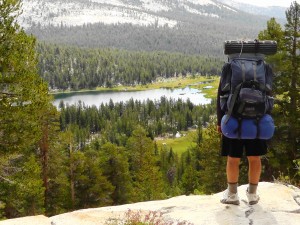 The word backpacking means carrying all your belongings on your back. The word by itself, however, does not really tell the entire story. For example backpacking in the backcountry is very different than backpacking in the frontcountry. It could mean the difference between:
The word backpacking means carrying all your belongings on your back. The word by itself, however, does not really tell the entire story. For example backpacking in the backcountry is very different than backpacking in the frontcountry. It could mean the difference between:
- hiking 20 miles and sleeping on the ground in the Desolation Wilderness
- riding 9 hours on a Eurail train and sleeping on a hostel bunk in Spain
To keep things straight, we need to pack more meaning into our backpacking words. As a service to the confused, I offer my own repackaged definitions of common backpacking terms, uncommon terms, and terms that don’t really exist but should.
Common Terms:
- Wilderness Backpacking: Carrying on your back all the necessary food and gear to be self-sustaining and self-righteous in the wilderness.
- Urban Backpacking: Using a backpack as a suitcase, but otherwise traveling by planes, trains and automobiles. Also known as “Seriously, this is not really backpacking.”
- Thru-Hiking: The process of hiking a very long trail from end to end. The term typically applies to the Appalachian Trail or the Pacific Crest Trail. The hiking term may be confusing if it suggests this can be done without staying out overnight. Thru-backpacking actually makes more sense, but thru-hiking is the term used.
- Ultralight Backpacking: Wilderness backpacking with a base weight under 10 pounds. This usually involves giving up traditional comforts such as a tent, a stove, and a change of underwear. Ultralight backpackers value “miles” over “smiles.”
Less Common Terms:
- Super-Ultralight Backpacking (SUL): Wilderness backpacking with a base weight under 5 pounds. Seriously?
- Extreme-Ultralight Backpacking (XUL): Wilderness backpacking with a base weight under 3 pounds. Oh this is just ridiculous
- Fastpacking: Backpacking for speed. Combine ultralight with trail running shoes. Now get going, you’re wasting time!
- Slackpacking: Hiking wilderness trails, but being easily distracted by comfort. A slackpacker may day hike between hotels to avoid sleeping on the ground. Slackpackers are often found in pubs discussing the wonders of the great outdoors. They appear conflicted when offered a choice between eating on the patio or indoors.
- Flashpacking: No this does not involve exposing private parts. Flashpacking is upscale backpacking. Flashpackers have larger budgets which they gladly use for gadgets and comfort. Urban flashpackers stay in fancy hotels and eat in high end restaurants. Wilderness flashpackers carry the latest technology such as a solar charged smartphone, mapping GPS, fully loaded eReader, and an emergency beacon to summons technical support.
- Fatpacking: A marketing term used by Fatpacking.com to mean backpacking with the intent of becoming NOT fat.
- Fitpacking: A marketing term used by Fitpacking.com to mean backpacking with the intent of becoming NOT NOT fit. In the name of semi-transparency, I have guided for both Fatpacking and Fitpacking, but only because they are in fact one and the same. I imagine that Fatpacking gets more media interest, but Fitpacking is probably what most customers tell their friends they are doing.
Terms That Don’t Exist But Should:
- Snackpacking: Backpacking without any cookware or stove. Snackpackers typically survive on cases of melted Snickers bars from Costco.
- Meatpacking: Backpacking with carnivores. Vegetables? We don’t need no stinking vegetables.
- Ratpacking: Backpacking without any clear understanding of what should be left at home.
- Plaquepacking: A form of ultralight backpacking where the participant can no longer cut off any more of his toothbrush handle, so he simply leaves the dang thing home.
- Statpacking: Backpacking with the goal of increasing your impressive statistics, such as: peaks bagged, famous trails conquered, and family birthdays completely forgotten.
- Tracepacking: The opposite of leave no trace packing. Tracepacking typically involves burning foil wrappers and cans in the campfire.
- Flatpacking: Intentionally backpacking in areas with little elevation change. Florida is a prime location for flatpacking. Himalayas, not so much.
- Quackpacking: Backpacking with certified Wilderness First Responders.
- Flackpacking: Backpacking with people who share no interest in food planning or preparation, yet manage to share observations regarding results.
- Yackpacking: Backpacking with parents of genetically gifted children who will not shut up already!
- Smackpacking: The results of backpacking with someone yackpacking.
- Wackpacking: Escalation from smackpacking. Also known as Sicilian backpacking.
- Backunpacking: The process of opening gear and releasing the unmistakeable odors of a backpacking trip.
- ThroughHiking: Similar to thru-hiking, but shorter. A lot shorter.
